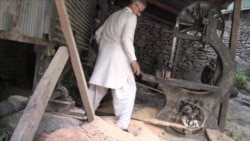In energy-starved Pakistan, the government is focused on building complex, multi-billion-dollar power stations to meet the demand for electricity.
Simple solution for a big problem
But one entrepreneur in a small village in the Pakistan-administered Kashmir region has a much simpler, cheaper solution that could help many in this mountainous region.
Ashiq Hussain Kazmi owns a watermill, locally known as “jandar,” that for six decades has been grinding grain to feed people in Bagh Syedan village, 20 kilometers from the regional capital, Muzafarabad.
Kazmi said the mill needs a major overhaul, especially after the October 2005 earthquake. “The mechanical system installed here is very old and needs to be replaced to improve performance. The earthquake also damaged parts of its foundation but we are running it because it is simply not possible for us to get it repaired,” he said.
Like many places in Pakistan, Kazmi said that his village and surrounding settlements are plunged into darkness after sunset because of the government’s plan to not overtax the weak electrical grid. Many rely on candles and wood to light their houses and cook food.
Electrical appliances, particularly television sets and refrigerators have been switched off permanently. Villagers sometimes cannot charge the batteries of their cell phones to stay in contact with relatives.
With no hope from the political leadership to provide immediate relief, Kazmi looked to his aging watermill for a solution.
Using recycled materials
He traveled to the city to purchase used equipment and recycled cooper wires from a scrapyard. Over time, he succeeded in converting the mill into an electricity generator for less than $100.
“The 3.5-kilowatt turbine produces enough electricity to light eight houses of our family, Kazmi said. “Adding they could finally turn on their TVs and charge cell phone batteries while one refrigerator is also running on the power being generator.”
“If the government cooperates and a bigger turbine of around 7.5 kilowatts is placed here, we can supply electricity to not only our entire village of 800 people but also to the neighboring settlements,” he added.
There are hundreds of watermills in the poverty-stricken Kashmir region, but Kazmi is one of only a few who could afford the conversion costs to become power generators.
Government's plan to invest
Regional Planning chief Mansoor Qadir Dar said the government is now looking into providing funds for such projects, but admits the administration has only recently come to know about the untapped energy potential that watermills offer.
“They [mill owners] have to send us the resolution that the mill is available and water is there and we need such and such technical and financial support, we will give them that financial support and we have also funds earmarked for this particular facility,” Dar claimed.
Prime Minister Nawaz Sharif’s government has vowed to resolve the electricity crisis by 2018, when several proposed energy mega-projects will be completed and begin adding thousands of new megawatts of power to the national grid.
Pakistan faces an annual electricity shortfall of around 4,500 megawatts in the peak summer months of June and July.
Last month, Prime Minister Sharif inaugurated a 100-megawatt Chinese-built solar power plant in central Cholistan desert in Punjab that will eventually add 1,000 megawatts to the national grid over the next two years to make it one of the world’s biggest solar parks, according to officials.
China partner, investment agreements
Pakistan and China have also recently unveiled a $46-billion investment plan dubbed the China-Pakistan Economic Corridor (CPEC).
Both countries signed investment agreements earlier this year when the Chinese president visited Islamabad to promote various gas, coal and solar energy projects that will generate thousands of megawatts of power over the next few years.
“Nearly $34 billion are envisaged for investment in the energy sector,” said Tariq Fatemi, the prime minister’s special assistant on foreign policy. “We expect 10,400 MWs to be added to the national grid in the next three years,” he said.
Skepticism, however, prevails in cash-strapped Pakistan about the official claims of ending the power crisis anytime soon in the wake of deteriorating security.
It is also widely perceived in Pakistan that politicians encourage multibillion-dollar mega-projects instead of focusing on home-made solutions only to pocket money through hefty kickbacks and commissions.
But Kazmi and other watermill owners in the Kashmir area believe that with a little government assistance, their facilities could help solve the problem for at least those people living nearby.





